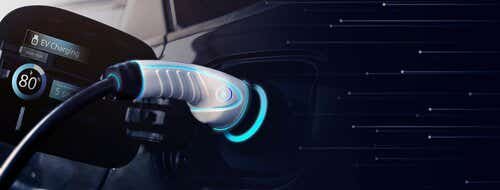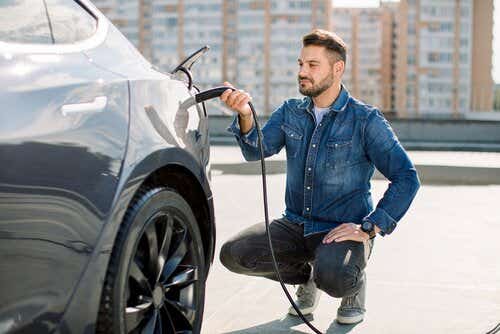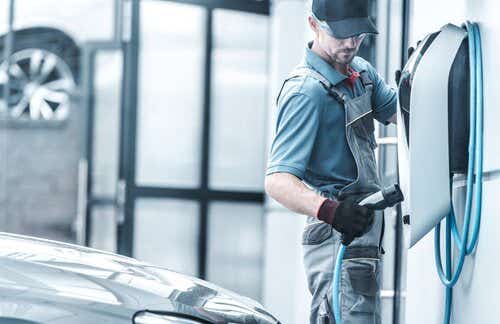How much does it cost to charge an electric car at home?
The main difference between petrol and electric cars is that you’ll usually charge an electric car at home rather than fill it with petrol. However, this means it will increase the cost of your electricity bill, but how much by?
Electricity costs slightly different amounts across the country - different regions will pay varying rates per unit of electricity used, as well as different daily standing charges - but currently the average cost per unit of electricity for a medium energy user in the UK is 28.3p. We can therefore use that as a baseline for overall electric vehicle charging costs.
The average EV usable battery size is 62.5 kWh, so we can use the formula of:
Electricity unit rate (enter as 0.283) x battery size (62.5 kWh) = cost to fully charge: £17.68
This formula can be applied to any EV - you just need to make sure you’re using the right electricity unit rate and the correct battery size.
| Electricity unit rate (UK average) | Usable battery size | Cost to fully charge | |
|---|---|---|---|
| Honda e | 28.3p | 28.5 kWh | £8.06 |
| Nissan Leaf | 28.3p | 37 kWh | £10.47 |
| Porsche Taycan GTS | 28.3p | 83.7 kWh | £23.68 |
| Mercedes EQS 450+ | 28.3p | 107.8 kWh | £30.50 |
Figures taken from https://ev-database.uk/
We can also work out the cost per mile by dividing the charging cost by the real-life distance the car can travel. The Honda e has a real-life distance of 105 miles on a full battery, so we would divide 5.38 by 105 to get a cost per mile of 0.05p.
These costs can come down even further if you sign up to a time-of-use energy tariff. These are designed to help energy customers save money by offering cheaper electricity at certain hours of the night (e.g. from 12am to 4am). Some energy suppliers offer as little as 4.5p per unit of electricity during these hours, though most cars will need longer than the cheaper time period to fully charge.
Nevertheless, we see how the overall charging costs come down with that lower unit rate:
| Time-of-use electricity unit rate (example) | Usable battery size | Cost to fully charge | |
|---|---|---|---|
| Honda e | 4.5p | 28.5 kWh | £1.28 |
| Nissan Leaf | 4.5p | 37 kWh | £1.66 |
| Porsche Taycan GTS | 4.5p | 83.7 kWh | £3.76 |
| Mercedes EQS 450+ | 4.5p | 107.8 kWh | £4.85 |
Figures taken from https://ev-database.uk/
These time-of-use tariffs are often marketed specifically as EV tariffs to entice EV owners to sign up to them, and present the most affordable way to charge an electric car at home. The flipside, though, is that suppliers charge much more for “peak” electricity in order to make up the shortfall caused by the off-peak hours. You therefore have to be disciplined about your energy use and know exactly what your overall spend is likely to be.
Other home charging costs
You will also need to pay for a home charging unit, which adds another £250 to £1,000 depending on how you get your charging unit.
How much does it cost to charge at work?
The cost of charging an electric car at work varies depending on the company policy - some offer free charging while some will charge a fixed rate.
How much does it cost to charge an electric car at public charging points?
The cost of charging an EV at public charging points varies - but not prohibitively so - depending on the type of charger and which company operates it. Some electric car charging points cost nothing, while some require standard contactless payments but you may need to have an account or a special electric car charging card to use others.
How do electric car charging cards work?
Radio frequency identification (RFID) electric car charging cards are used by most providers of public electric car charging stations, including Ecotricity and Shell Recharge. You’ll usually need to also download the provider’s mobile app or go to its website, where you should have an account connected to the card. This is, admittedly, a drawback of the public charging system, but a UK-wide rollout of many more charging points that take contactless payment is underway.
How much does it cost to charge an electric car at rapid public charging points?
Paying to charge your EV at rapid public EV charging points works in the same way as using public electric vehicle charging points with lower charging rates. Because they are more powerful and can charge cars more quickly than other chargers, they tend to cost more to use.
For instance, Pod Point's rapid chargers charge at a rate of 26p per kWh at Lidl - this would cost about about £6 or £7 for half an hour of charging, which provide roughly 100 miles of range.
How does the cost of a petrol vehicle compare?
While we know that charging an EV is going to cost less than filling up a £60 tank of petrol every week, the other costs you need to think about when making the switch from petrol to an electric car include:
Purchase - most electric cars will cost more than their petrol counterparts because there are fewer options and the technology they use is newer, so the initial outlay will be higher
Maintenance - however, in addition to charging being much cheaper than filling up the tank, maintenance costs should be much lower because there are fewer parts to wear out and stop working when you compare an EV battery to an internal combustion engine.
There might be more money needed to pay at the beginning, but over the course of the car’s life, the cost of running and maintaining it should be much lower than if you had a petrol or diesel car.
Unsure if you need an EV home charger? Find the advice you need for the stage you're at here.

I'm considering buying an EV
If you're thinking about getting an EV, what do you need to consider when it comes to charging?

My EV is on the way
If you've ordered an EV, what do you need to do to prepare for its arrival?

I already have an EV
If you have an EV and you're considering installing a home charger, we can help advise you.
FAQs
Can electric cars be more expensive to run than petrol?
As we’ve said, electric cars tend to be more expensive than petrol cars when it comes to the initial outlay, but unless fuel prices crash or you charge your EV in the most inefficient way possible (maybe by using a three-pin plug, which would mean charging times of more than 24 hours), it's unlikely that an electric car would be more expensive to run than a petrol car.
Are there any free public electric car charge points?
Free electric car charging is possible - there are around 5,000 free public EV charging stations, located at supermarkets, hotels, car parks and public attractions looking to entice visitors. Ultimately, they’re probably not really free - you’d expect to pay to visit the places that operate them - but in theory, you won’t have to worry about RFID cards or provider accounts to use them.
How many electric vehicle charging points are in the UK?
According to Zap Map, there are nearly 29,000 public EV charging stations and just over 5,000 rapid chargers in the UK as of January 2022, with many more installations planned between now and 2030, when sales of new petrol and diesel cars will be banned. Additionally, it’s estimated that there are around 300,000 home charging units installed at properties across the country.




